一词多个
- 格式:doc
- 大小:132.00 KB
- 文档页数:24
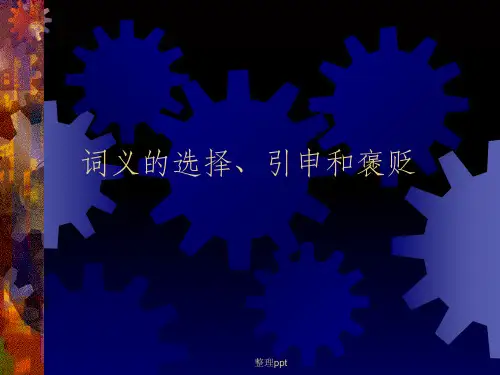
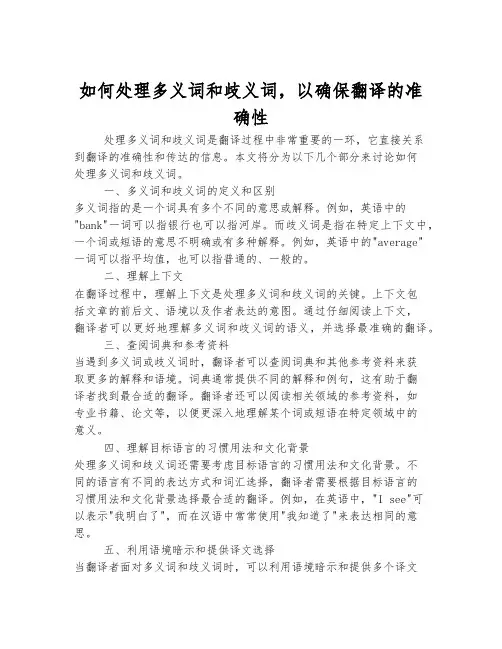
如何处理多义词和歧义词,以确保翻译的准确性处理多义词和歧义词是翻译过程中非常重要的一环,它直接关系到翻译的准确性和传达的信息。
本文将分为以下几个部分来讨论如何处理多义词和歧义词。
一、多义词和歧义词的定义和区别多义词指的是一个词具有多个不同的意思或解释。
例如,英语中的"bank"一词可以指银行也可以指河岸。
而歧义词是指在特定上下文中,一个词或短语的意思不明确或有多种解释。
例如,英语中的"average"一词可以指平均值,也可以指普通的、一般的。
二、理解上下文在翻译过程中,理解上下文是处理多义词和歧义词的关键。
上下文包括文章的前后文、语境以及作者表达的意图。
通过仔细阅读上下文,翻译者可以更好地理解多义词和歧义词的语义,并选择最准确的翻译。
三、查阅词典和参考资料当遇到多义词或歧义词时,翻译者可以查阅词典和其他参考资料来获取更多的解释和语境。
词典通常提供不同的解释和例句,这有助于翻译者找到最合适的翻译。
翻译者还可以阅读相关领域的参考资料,如专业书籍、论文等,以便更深入地理解某个词或短语在特定领域中的意义。
四、理解目标语言的习惯用法和文化背景处理多义词和歧义词还需要考虑目标语言的习惯用法和文化背景。
不同的语言有不同的表达方式和词汇选择,翻译者需要根据目标语言的习惯用法和文化背景选择最合适的翻译。
例如,在英语中,"I see"可以表示"我明白了",而在汉语中常常使用"我知道了"来表达相同的意思。
五、利用语境暗示和提供译文选择当翻译者面对多义词和歧义词时,可以利用语境暗示和提供多个译文选择。
在源语言中,词或短语周围的其他词汇和句子结构通常会提供一些线索,帮助翻译者理解其具体含义。
翻译者可以根据这些暗示提供多个翻译选项,并在目标语言中注明相应的语境。
六、给予译文说明和标注在翻译过程中,翻译者可以给予译文说明和标注,以帮助读者理解译文中可能存在的歧义和多义。

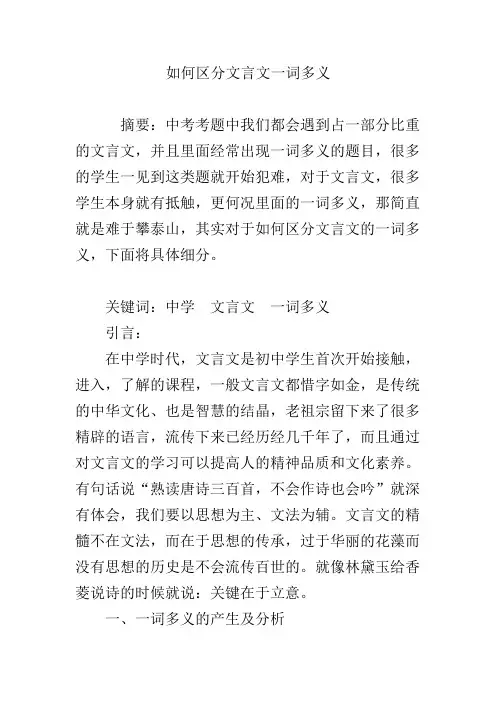
如何区分文言文一词多义摘要:中考考题中我们都会遇到占一部分比重的文言文,并且里面经常出现一词多义的题目,很多的学生一见到这类题就开始犯难,对于文言文,很多学生本身就有抵触,更何况里面的一词多义,那简直就是难于攀泰山,其实对于如何区分文言文的一词多义,下面将具体细分。
关键词:中学文言文一词多义引言:在中学时代,文言文是初中学生首次开始接触,进入,了解的课程,一般文言文都惜字如金,是传统的中华文化、也是智慧的结晶,老祖宗留下来了很多精辟的语言,流传下来已经历经几千年了,而且通过对文言文的学习可以提高人的精神品质和文化素养。
有句话说“熟读唐诗三百首,不会作诗也会吟”就深有体会,我们要以思想为主、文法为辅。
文言文的精髓不在文法,而在于思想的传承,过于华丽的花藻而没有思想的历史是不会流传百世的。
就像林黛玉给香菱说诗的时候就说:关键在于立意。
一、一词多义的产生及分析时代在不断发展,而随着社会的发展语言文化也就随着发展和变化。
最开始的时候,词都是只有一个意思的,但随着时间的发展,时代也在进步,文化也越来越进步,慢慢的一些词就有了更多的含义,就就产生了一词多义。
当中学生初步接触文言文是,第一个老大难就是里面的词,义,对其把握不准,尤其是里面的一词多义,有时还有一词多音是很难区分的,为了让中学生可以在初步接触他的过程中可以了解它,认识它,进而记住它,最后把握它。
一词多义,字面意思就是一个词,它所代表的不止一个意思,它在具体的不同的文言文语言的环境下,它的含义是不固定的。
我们只有针对具体情况来分析,不同的状态下它的词义和词性也是不同的。
在文言文中一词多义的情况,有时一个词的含义可以多达五六个,有的甚至有是十几个。
为什么会出现一词多义呢,以前古人通常用单音词来表达复杂多样的意思。
这种现象很普遍,就造成了一词多义现象。
但是一个词虽然拥有多种含义,但它并不是随便定义的,都是有据可循的。
它最早的含义是本义,而从中引申出来的叫做引申义。
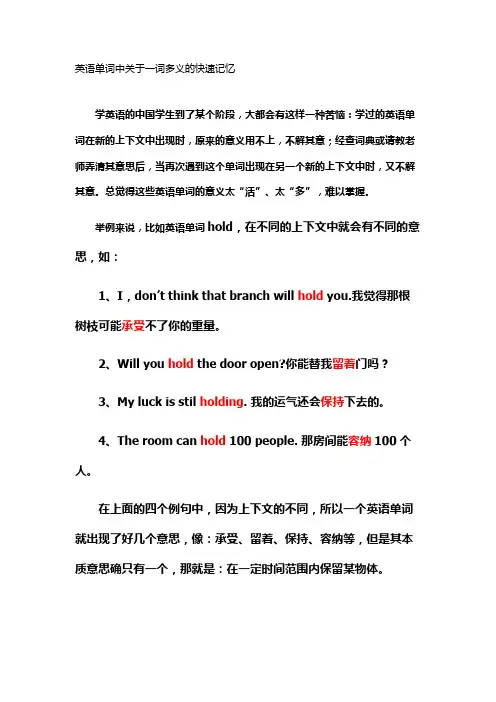
英语单词中关于一词多义的快速记忆学英语的中国学生到了某个阶段,大都会有这样一种苦恼:学过的英语单词在新的上下文中出现时,原来的意义用不上,不解其意;经查词典或请教老师弄清其意思后,当再次遇到这个单词出现在另一个新的上下文中时,又不解其意。
总觉得这些英语单词的意义太“活”、太“多”,难以掌握。
举例来说,比如英语单词hold,在不同的上下文中就会有不同的意思,如:1、I,don’t think that branch will hold you.我觉得那根树枝可能承受不了你的重量。
2、Will you hold the door open?你能替我留着门吗?3、My luck is stil holding. 我的运气还会保持下去的。
4、The room can hold 100 people. 那房间能容纳100个人。
在上面的四个例句中,因为上下文的不同,所以一个英语单词就出现了好几个意思,像:承受、留着、保持、容纳等,但是其本质意思确只有一个,那就是:在一定时间范围内保留某物体。
绝大多数的英语单词都会有少则四、五个,多则二十、三十多个的中文意思,这在给我们具体使用时带来了极大的困难。
让我们对英语单词的使用无所适从,总感觉英语单词的意思太多、太灵活,让我们摸不着头脑,不知道如何学习和使用,只有通过大量的句子,文章,听写等等不断练习体会,才能慢慢的体会到那种模模糊糊的,说不清楚的英语单词真正的“根本含义”。
理解记单词解决方案:理解记单词充分利用左脑的理解记忆能力,通过详尽的分析得出结论,每一个英语单词都有一个最最根本的含义,我们理解记单词叫做“根意”,在英汉翻译中,由于英汉表达习惯不同,不能把英语单词的根意,不做任何处理地应用在不同的上下文中,而是必须根据不同的上下文,给出不同的“译意”,使其符合汉语习惯。
这些给出的译意(翻译出来的众多意思)就是我们通常所理解的“一词多义”。
我们只要善加利用左脑超强的理解能力,那么我们对英语单词的融会贯通、学以致用就不会难。
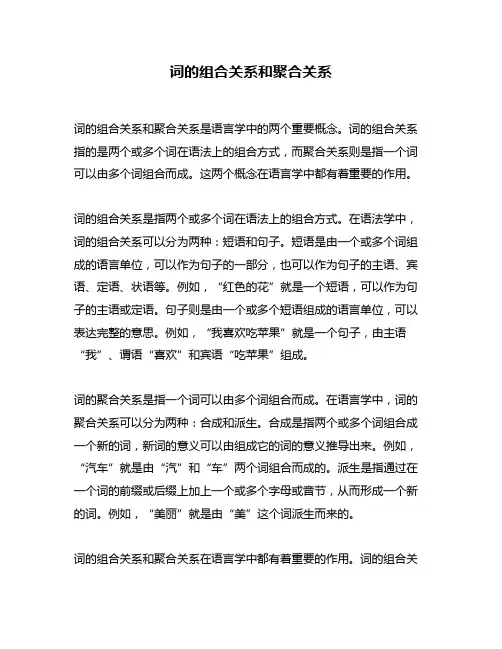
词的组合关系和聚合关系词的组合关系和聚合关系是语言学中的两个重要概念。
词的组合关系指的是两个或多个词在语法上的组合方式,而聚合关系则是指一个词可以由多个词组合而成。
这两个概念在语言学中都有着重要的作用。
词的组合关系是指两个或多个词在语法上的组合方式。
在语法学中,词的组合关系可以分为两种:短语和句子。
短语是由一个或多个词组成的语言单位,可以作为句子的一部分,也可以作为句子的主语、宾语、定语、状语等。
例如,“红色的花”就是一个短语,可以作为句子的主语或定语。
句子则是由一个或多个短语组成的语言单位,可以表达完整的意思。
例如,“我喜欢吃苹果”就是一个句子,由主语“我”、谓语“喜欢”和宾语“吃苹果”组成。
词的聚合关系是指一个词可以由多个词组合而成。
在语言学中,词的聚合关系可以分为两种:合成和派生。
合成是指两个或多个词组合成一个新的词,新词的意义可以由组成它的词的意义推导出来。
例如,“汽车”就是由“汽”和“车”两个词组合而成的。
派生是指通过在一个词的前缀或后缀上加上一个或多个字母或音节,从而形成一个新的词。
例如,“美丽”就是由“美”这个词派生而来的。
词的组合关系和聚合关系在语言学中都有着重要的作用。
词的组合关系可以帮助我们理解句子的结构和语法规则,从而更好地理解语言。
而词的聚合关系则可以帮助我们扩大词汇量,从而更好地表达自己的意思。
在学习语言的过程中,我们需要掌握词的组合关系和聚合关系,才能更好地理解和运用语言。
总之,词的组合关系和聚合关系是语言学中的两个重要概念,它们在语言学中都有着重要的作用。
掌握这两个概念可以帮助我们更好地理解和运用语言,从而更好地表达自己的意思。
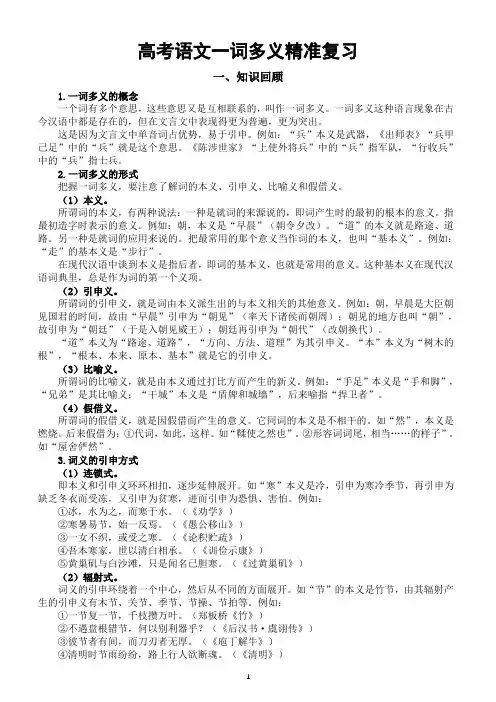
高考语文一词多义精准复习一、知识回顾1.一词多义的概念一个词有多个意思,这些意思又是互相联系的,叫作一词多义。
一词多义这种语言现象在古今汉语中都是存在的,但在文言文中表现得更为普遍,更为突出。
这是因为文言文中单音词占优势,易于引申。
例如:“兵”本义是武器,《出师表》“兵甲已足”中的“兵”就是这个意思。
《陈涉世家》“上使外将兵”中的“兵”指军队,“行收兵”中的“兵”指士兵。
2.一词多义的形式把握一词多义,要注意了解词的本义、引申义、比喻义和假借义。
(1)本义。
所谓词的本义,有两种说法:一种是就词的来源说的,即词产生时的最初的根本的意义。
指最初造字时表示的意义。
例如:朝,本义是“早晨”(朝令夕改)。
“道”的本义就是路途、道路。
另一种是就词的应用来说的。
把最常用的那个意义当作词的本义,也叫“基本义”。
例如:“走”的基本义是“步行”。
在现代汉语中谈到本义是指后者,即词的基本义,也就是常用的意义。
这种基本义在现代汉语词典里,总是作为词的第一个义项。
(2)引申义。
所谓词的引申义,就是词由本义派生出的与本义相关的其他意义。
例如:朝,早晨是大臣朝见国君的时间,故由“早晨”引申为“朝见”(率天下诸侯而朝周);朝见的地方也叫“朝”,故引申为“朝廷”(于是入朝见威王);朝廷再引申为“朝代”(改朝换代)。
“道”本义为“路途、道路”,“方向、方法、道理”为其引申义。
“本”本义为“树木的根”,“根本、本来、原本、基本”就是它的引申义。
(3)比喻义。
所谓词的比喻义,就是由本义通过打比方而产生的新义。
例如:“手足”本义是“手和脚”,“兄弟”是其比喻义;“干城”本义是“盾牌和城墙”,后来喻指“捍卫者”。
(4)假借义。
所谓词的假借义,就是因假借而产生的意义。
它同词的本义是不相干的。
如“然”,本义是燃烧。
后来假借为:①代词,如此,这样。
如“鞣使之然也”。
②形容词词尾,相当……的样子”。
如“屋舍俨然”。
3.词义的引申方式(1)连锁式。
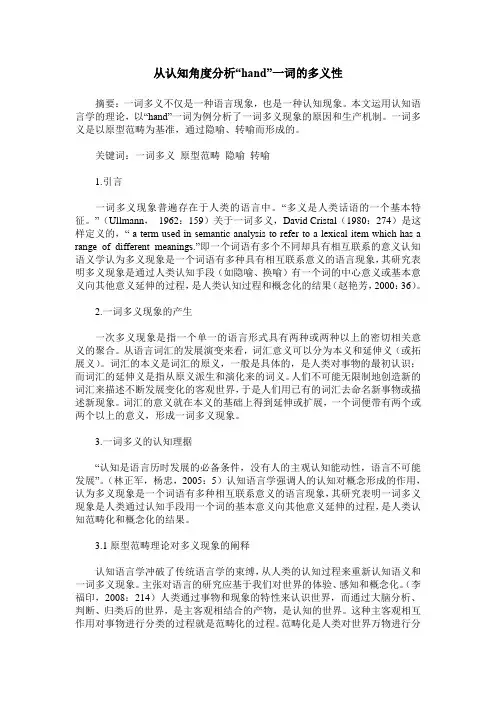
从认知角度分析“hand”一词的多义性摘要:一词多义不仅是一种语言现象,也是一种认知现象。
本文运用认知语言学的理论,以“hand”一词为例分析了一词多义现象的原因和生产机制。
一词多义是以原型范畴为基准,通过隐喻、转喻而形成的。
关键词:一词多义原型范畴隐喻转喻1.引言一词多义现象普遍存在于人类的语言中。
“多义是人类话语的一个基本特征。
”(Ullmann,1962:159)关于一词多义,David Cristal(1980:274)是这样定义的,“ a term used in seman tic analysis to refer to a lexical item which has a range of different meanings.”即一个词语有多个不同却具有相互联系的意义认知语义学认为多义现象是一个词语有多种具有相互联系意义的语言现象,其研究表明多义现象是通过人类认知手段(如隐喻、换喻)有一个词的中心意义或基本意义向其他意义延伸的过程,是人类认知过程和概念化的结果(赵艳芳,2000:36)。
2.一词多义现象的产生一次多义现象是指一个单一的语言形式具有两种或两种以上的密切相关意义的聚合。
从语言词汇的发展演变来看,词汇意义可以分为本义和延伸义(或拓展义)。
词汇的本义是词汇的原义,一般是具体的,是人类对事物的最初认识;而词汇的延伸义是指从原义派生和演化来的词义。
人们不可能无限制地创造新的词汇来描述不断发展变化的客观世界,于是人们用已有的词汇去命名新事物或描述新现象。
词汇的意义就在本义的基础上得到延伸或扩展,一个词便带有两个或两个以上的意义,形成一词多义现象。
3.一词多义的认知理据“认知是语言历时发展的必备条件,没有人的主观认知能动性,语言不可能发展”。
(林正军,杨忠,2005:5)认知语言学强调人的认知对概念形成的作用,认为多义现象是一个词语有多种相互联系意义的语言现象,其研究表明一词多义现象是人类通过认知手段用一个词的基本意义向其他意义延伸的过程,是人类认知范畴化和概念化的结果。
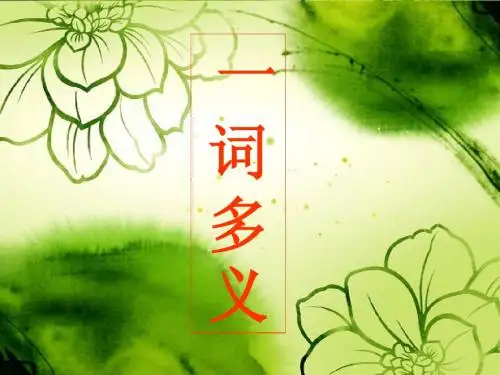
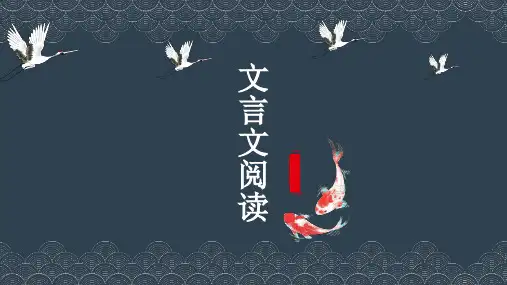
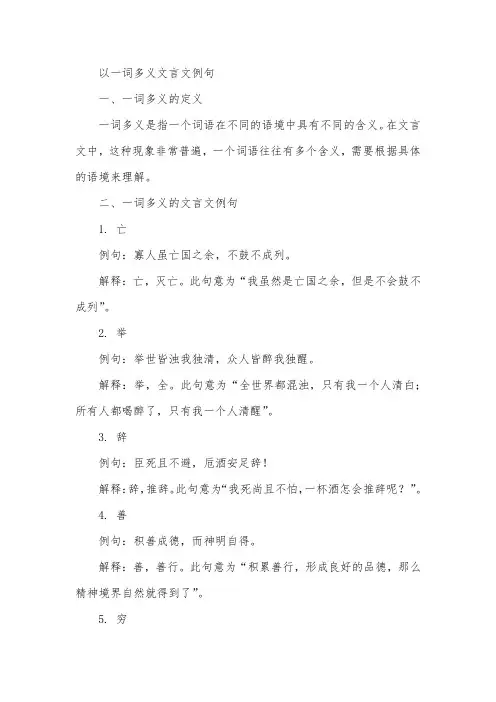
以一词多义文言文例句
一、一词多义的定义
一词多义是指一个词语在不同的语境中具有不同的含义。
在文言文中,这种现象非常普遍,一个词语往往有多个含义,需要根据具体的语境来理解。
二、一词多义的文言文例句
1. 亡
例句:寡人虽亡国之余,不鼓不成列。
解释:亡,灭亡。
此句意为“我虽然是亡国之余,但是不会鼓不成列”。
2. 举
例句:举世皆浊我独清,众人皆醉我独醒。
解释:举,全。
此句意为“全世界都混浊,只有我一个人清白;所有人都喝醉了,只有我一个人清醒”。
3. 辞
例句:臣死且不避,卮酒安足辞!
解释:辞,推辞。
此句意为“我死尚且不怕,一杯酒怎会推辞呢?”。
4. 善
例句:积善成德,而神明自得。
解释:善,善行。
此句意为“积累善行,形成良好的品德,那么精神境界自然就得到了”。
5. 穷
例句:穷则独善其身,达则兼济天下。
解释:穷,不得志。
此句意为“不得志时就要洁身自好修养个人品德,得志时就使天下都能这样”。
6. 乘
例句:沛公之参乘樊哙者也。
解释:乘,骑马乘车。
此句意为“他是沛公的参乘樊哙”。
7. 负
例句:宁教我负天下人,休教天下人负我!
解释:负,辜负。
此句意为“宁可让我辜负天下人,也休让天下人辜负我”。
8. 故
例句:故远人不服,则修文德以来之。
解释:故,所以。
此句意为“所以如果远方的人还不归服,就要用仁义礼乐使他们归顺”。
部编新人教版语文四年级下册一词多义专项训练一、基础知识我们日常生活中常用的词语有两千多个,正确地理解这些词语的意思,为更好地阅读和作文打下坚实的基础。
汉语中,很多词语在不同的语言环境中所表现的意义是不同的。
因此,理解词语的不同含义,是小学阶段语言学习中很重要的一个环节。
课文中出现的生词,一般可分三类:一类是由生字组成的,一类是由生字和熟字组成的,还有一类是由熟字和熟字组成的。
这三类生词,都可以让学生自已来理解词义,一般可以用查字典的方法来理解,从字典中找出这个词在课文中的意思。
而对于难以用查字典的方法来解决的,则可以用下列方法来理解。
1.依据词语所在句子的内容理解词义。
俗话说“词不离句”,如“骄傲”在不同的语言环境中所表达的词性就是不同的:例如:“我为自己是个中国人而骄傲。
”其中“骄傲”是“自豪”的意思,是褒义。
“这个同学学习有一点点进步就会骄傲。
”这个“骄傲”是“自以为了不起”,就是一个贬义词。
2.通过分析语素来理解词义。
例如:在《精彩的马戏》一课中有“哄笑”一词,我们就要知道:哄,是许多人在一起发出的声音,哄笑就是许多人一起大笑起来。
又如:《颗粒归公》中“颗粒归公”这个词语,要想理解这个词语,我们就要知道“颗”和“粒”是指小的圆粒或小的块状物,“公”指公家,“归”就是归还,那么“颗粒归公”就是一颗一粒(这里指粮食)都要归还给公家。
运用分析语素的方法来解释词语的含义,可以比较确切地理解词义,并且易学,好记,学得活,记得牢。
即使临时忘记了这个词语的意思,也可以通过分析语素正确理解它的意思。
3.依据相关文字的思路理解词义。
有的词语在文中的跨度大,仅仅依靠当句或前后句所述的内容还不能准确判断其意思,这就要靠对相关文字的思路作分析来解决。
例如:这种奖赏,不要误解为“抛来”的东西,这是“抛给”的,说得冠冕些,可以称之为“送来”,但我们被“送来”的东西吓怕了。
先有英国的鸦片,德国的废枪炮,后有法国的香粉,美国的电影,日本的印着“完全国货”的各种小东西。
一个词语多个意思的小故事作文哎呀,今天我学到了一个特别好玩的事儿。
我们在课堂上,老师说:“谁能说说‘意思’这个词的不同意思呀?”嘿呀,这可把我难住了。
然后小明就站起来说:“老师说的‘意思’就是让我们回答问题的那个意思。
”哈哈,大家都笑了。
接着小红说:“我给妈妈送了一朵花,妈妈说‘这是什么意思’,这里的‘意思’就是问我为什么这么做。
”哎呀,好像是这么回事呢。
我也赶紧举手说:“有时候我们会说‘真有意思’,这里的‘意思’就是有趣。
”嘿嘿,我觉得我也说得挺对的。
老师笑着点点头说:“大家说得都很好呀,‘意思’这个词确实有很多不同的含义呢。
”
哎呀呀,原来一个词语可以有这么多意思呀,真是太有趣啦!哈哈。
一个词语多个意思例子
一、手腕
1、手和臂连接的部分。
举例:那用圆润的手腕,遮着太阳,一对黑大的眼睛,向我注视的,不是S是谁?
2、手段,伎俩。
举例:他作梦也想不到郭振山就在这个时候又玩弄起两面派手腕来了。
二、狡猾
1、诡诈刁钻。
亦指诡诈刁钻之人。
举例:狮子似的凶心,兔子的怯弱,狐狸的狡猾。
2、机灵。
举例:我现在已经有一儿一女,都是狡猾可喜的宝贝。
三、对头
1、合得来(多用于否定式)。
举例:这两个人脾气不对头,处不好。
2、正确。
举例:对头!这才是我要表达的意思,就你听明白了。
四、关节
1、骨头互相连接的地方。
举例:那个家伙得意了,把手指关节弄得咯咯作响。
2、关键;重要环节。
举例:周仆在几个关节问题上作了发挥。
五、头脑
1、脑袋。
举例:二奶奶听到这句话,头脑如突受打击,岑岑地发胀。
2、指思考、记忆等能力。
举例:新青年有三畏:畏不强硬,畏不合逻辑,畏没头脑!。
文献综述英语英语一词多义的语义关系及词汇记忆方法研究一、前言部分(说明写作的目的,介绍有关概念,扼要说明有关主题争论焦点)英语作为世界上使用最广的语言,如其他语言一样,一直不停地变化发展着。
英语中的词的定义:语言学家对词下的定义说法不一,措辞不同,但涉及的基本内容不外乎音和义的问题。
林林总总概括起来说,词是语音、意义和语法特点三者统一的整体。
一个词刚出现的时候只是用作一定的食物、现象、性质或者行为的名称因而基本只有一个意思,在接下来的语言发展中慢慢的就获得了新的意义,这样便形成了一词多义(polysemy)。
自千余年前成型至今,英语已然发生了天翻地覆的变化。
词由原来的单义变化到后来的多义中间究竟经历了一个怎样的过程?如何利用一词多义的内在规律对词汇进行认知和记忆?这两个问题是本文所讨论的重点。
1目前问题:单个词的多种意思之间是否有联系?如果有如何利用这些联系进行记忆单词?如何更有效的记忆单词并且不容易忘记?一词多义现象是一个单一的语言形式具有两种或两种以上密切相关意义的聚合。
一词多义是一种重要的语言现象,普遍存在于各种语言现实中。
语义学创始人布雷尔(M·Br&a1)认为一词多义是由语言经济原则造成的。
通过赋予同一词形以更多的词义来减少词的数量,减少人们记忆词汇的负担。
Lyons指出。
几乎可以定现在没有,以往也从未曾有过任何一种自然语言,只存在一词一义。
既然一个词会出现多种意义,那么这些意义的出现是任意的,还是有理据的呢?各个意义之闻是孤立的,还是有联系的呢?这一直是语言学家探讨的问题。
传统的语言理论从索绪尔符号理论到现代的各种语义理论都没有完整地解释多义现象,因此就不能掌握其实质。
在人们记忆英语单词的过程中可否运用这些联系进行快速有效的记忆单词,如何应用也是现在语言学界热议的问题之一。
关于单词的记忆,对于学英语的人士来说一直是个头痛的问题,语言学家们也在研究各种各样的记忆方法,但是怎样使自己背单词更加有效率还要寻找其词的规律,顺道而行。
【精品】一词多义成语举例一词多义成语指的是一个成语存在多个含义,这种成语在汉语中比较常见。
下面举一些例子来说明这一现象。
1.深居简出:这个成语原意是指一个人住在深山之中,很少出门,过着简单的生活。
但是,现在这个成语常常用来形容一个人很少外出,很少与外界接触,躲在某个隐蔽的地方。
2.登峰造极:这个成语原意是指攀登到山峰的顶点,但是现在的用法却变成了形容某个事物达到了极点,或者某个人取得了很高的成就。
3.无微不至:这个成语原意是指没有一处细微的地方不考虑周到,但是现在却常常用来形容某个人非常细心周到,连一些小事情都能注意到。
4.众所周知:这个成语原意是指大家都知道,但是现在的用法却变成了大家都应该知道,或者大家都应该了解的意思。
5.时过境迁:这个成语原意是指时间过去了,境遇也发生了变化,但是现在却常常用来形容某些事情已经发生了很大的变化,或者某些人已经不再年轻。
6.视死如归:这个成语原意是指把死看得像回家一样平常,但是现在却常常用来形容某个人非常勇敢,不怕牺牲。
7.举一反三:这个成语原意是指举一个例子就能推导出其他类似的例子,但是现在却常常用来形容某个人非常聪明,能够触类旁通。
8.千言万语:这个成语原意是指很多话,但是现在却常常用来形容某个人非常能说,或者某个人非常懂得表达自己的感情。
9.信手拈来:这个成语原意是指随手拿来,但是现在却常常用来形容某个人非常轻松地完成某项任务,或者某个人非常轻松地获得某种成功。
10.粉墨登场:这个成语原意是指化装上台演戏,但是现在却常常用来形容某些人为了谋取某种利益而进行表演或行动。
一词多义成语在语言中是很常见的现象。
它们不仅是语言发展的产物,也是社会文化、语境和人类认知等多种因素共同作用的结果。
对于学习者来说,理解这些成语的多个含义及其适用的语境是非常重要的。
这不仅有助于提高语言的理解和运用能力,也能更好地体会到汉语的博大精深和丰富内涵。
通过以上例子,我们可以看到,一词多义成语的理解和使用需要结合具体语境和上下文来进行。
开始Begin, start, begin with, spring, start up, set off on, break out, strike up, originate from,;Initiate, launch, originate, sprout; unfold; unleashoutset, onset,Rudimentary, elementary,出现Appear, appear to be, emerge, arise, loom, turn out, show up, com out, come into sight/view, come forth发生Happen, occur, take place, come about,Happening occurrence产生,创造create, produce, bring about, yield, give birth to, bear, bring into being, generate, b eget,germinate;Invent, innovate, renovate, plan, design, imagine, conceive, devise, formulate, imagi ne, envision,建立Found, set, built up, construct, institute, constitute, set up, establish制造,组成Make, make up, produce, construct, turn out, manufacture, form, shape, compose, c ompile, concoct, fabricate生长壮大复制,繁殖58Copy, duplicate, reproduce, multiply.发育,发展Grow, develop, breed, bring up, nurture, cultivate, hone, raise, foster, (主动) Develop, advance, progress, move forward, go forward, proceed(自我成长)Burgeon, flourish, thrive, bloom, blossom, boom, prosper;保持,延续Continue, last, carry on, keep on, keep, remain maintain retainPerpetuate,Persevere, stick with, insist on, persist in,Continuous, incessant, permanent, constant, steady, unbroken, perpetual, everlasting, eternal, lasting, unending, uninterrupted, undying, immortal, invariable,存在,生存Exist,found, stand, lay in, be rooted in,be embedded in,Substance, matter, object, material, stuff, things, entity,individual, creature, beings,Topic, subject, issue, theme, gist, item, content, point,Extant, existing, in existence, substantive, ubiquitous, omnipresent, universal, survive,outlive,outlast, remain alive,Endure, undergo,从有到无结束,停止53stop,finish, be over, cease, discontinue, wind up, bring to an end(close, halt), end,come to an end, end up, terminate,quench,quell,run out, expire, conclude adjourn/dissolve/lull/subvert,abortaive,Surcease, cessation,impasse, deadlock, logjam, stalemate,Ultimate, final, eventual,Abeyance, suspend, interruption, brake, halt, pause,死亡,毁灭Perish, annihilate, kill, exterminate, take life, slay, hatchet, slaughter, assassinate, fa mish, smother, throttle, strangle, stifle, decimate,Die, pass away, perish, expire, run out,decease, death, demise,Defunct, moribund, dying,Fatal, formidable, deadly, fatality.取消,废除550Cancel, annul,call off, do away with,Abolish, desuetude, disuse, abandon, repeal, revoke, invalidate, rescind, nullify Obsolete, out of date, outmoded, out of fashion, old-fashioned,除去551Remove,erase,delete, extinguish, exterminate, eliminate, eradicate, extirpate, effac e,clear away, throw away, do away with, wipe out, get rid of , rule out, Obliterate, expurgate, expunge, purify, purge,破坏Destroy, damage, wreck, devastate, raze, ravage, knock down, demolish, vandalize, tear down, ruin, spoil, dilapidate,Perdition,detrimental,harmful, injurious,topple down/inclement/伤害Damage Bruise, mar, maul, do harm to, injure, wound, hurt, impair, harm, hurt, wo und, harm, break, fracture, maim, cripple, mangle, mutilate;cut, gash, fracture, break灾祸Disaster, catastrophic, calamity, cataclysm, carnage, massacre, holocaust, decimate, wreck, accident,Misfortune, hapless, mishap,逐渐消亡Rot way, perish, decay, disintegrate, decompose, deteriorate, molder, aggravate, wor sen, exacerbate, corrupt,Rotten, decayed, corrupt, damaged;decrepit ,decrepitude, dilapidate状态之改变正面能力,强,权力Enable, facilitate, empower, entitle, enhance,Strengthen, reinforce, sustain, countenance, consolidate,Able, be capable of doing , competent, potent, omnipotent, puissant, resourceful Ability, capability, capacity, skill, forte,competence, facultyIntelligence, aptitude, flair, talentClever, bright, talented, astute, wisdom, wise, smart, acumen,Hegemony, puissance, resource, power, energy, authority, influence, impact, suprem acy, potency, strength, force, vigor;大Aggrandize, amplify, augment, broaden, widen, extend, enlarge, magnify, enlarge, Exaggerate, overstate, overstress, overemphasize,多,增加Enrich, increase, add to, abound, fill, fill up, replenish, stock up, add, put in, raise, Accrue, mount up, augment, accumulate, riseAbundant, plentiful, more than enough, profuse, copious, rich, wealthy, generous, n umerous, in great numbers;sufficient, enough, adequate, ample, as much as necessary,Increment, accretion, growth, augmentation,高Raise, lift up, improve, enhance, elevate, escalate, heave, heighten, hoist,Rise, increase, ascend, mount, go up, climb scale, jack up, skyrocket, surge, upsurg eHigh, tall, in height, lofty, towering, lanky;Height, stature, elevation, altitude有助Help, assist, aid, subsidize, help to, conduce to,, contribute to, function to, be of as sistance, lend a hand, facilitate, enhance,Helper, aide, assistant, accessory, ancillary, accomplice, auspices,支持Support, bolster, boost, brace, buttress, espouse, proponent, underpin, embrace, exp onent,快216Accelerate, hasten, speed up, quicken up, expediteRun, scurry, scuttle, scamper, prance, gallop, sprint, scud, Dart, fleet, rush,Fast, quick, rapid, swift, expeditious, speedy, fleeting, briskSpeed, swiftness, pace, velocity, rapidity, tempo, rate, quickness, promptness,有效,起作用Effective, efficient, effectual, successful, useful, helpful, functional, applicable, operati ve, working, active, functioning, in operation, in use,Available, serviceable,Impact, influence,自由,解脱Release, free, set free, set off, liberate, unshackle, unfetter, emancipate, manumit, d isentangle, untangle, extricate, unravel,中性变Change, alter, modify, vary, turn, become, adjust, amend, transform, distort, modula te, transmute, shift, transfigure,Fluctuate, move, revolutionize, alternate, shiftDiversified, volatile, fickle, mercurial, protean, erratic, eccentric, irregular, inconsisten t,Changeable, unsettled, variable, malleable, mutable,Change, alteration, variation, modification, transition, renovation, recondition, mutatio n;修改Redress, rectify, revise, emend, renovate, innovate, recondition,负面弱Weaken, enervate, vitiate, sap, impair, emaciate, attenuate, diluteWane, sag, fade, flag, deteriorate, exacerbate, wither, blight, dry up, wilt, sere, sear, shrink, shrivel,Weak, feeble, effete, wan, frail, lacking in strength, impotent, feeble, lethargic Infirmity, weakness, decadence, decadent,减少,降低Lower, reduce, decrease, drop off, abate, decline, dwarf, dwindle, rarefy, curtail, sh orten, abridge, truncate, dock, decline, slump, eclipse, subside, shrink, ebb, Diminish, lessen, debase, dilute, moderate, die down, grow less intense, cut down, ebb, cut back,慢Decelerate, slow, slow down, retard, hold back,Slow, sluggish,Postpone, put off, delay, defer, procrastinate, adjourn,Dilatory, tardy, slack, sluggish,平息reconcile, comfort, placate, conciliate, reassure,allay, calm, console, soothe, pacify, assuage, mitigate, palliate, salve, temper,palliation, reconciliation,禁止,限制Prohibit, proscribe, forbid, ban, restrain, interdict, overrule, veto, stop fromLimit, restrict, confine, blockade, fetter, shackle, circumscribeProhibited, forbidden, banned, illegal, outlawed, proscribed, taboo;Durance, taboo,控制, 抑制Control, wield, hold, steer, helm, maneuver, manipulate, dominate, regulate, rein in, direct, rule, govern, reign, regimentCurb, bridle, yoke, restrain inhibit smolder, suffocate,refrain from阻碍455Hinder, hamper, check, stunt, impede, block, obstruct, retard, interrupt, hold back, prevent from, forestall, keep from, deter from, discountenance, lumber, thwart, stem, stymie, frustrate, stump, stem,Entangle, enmesh, ensnare, entrap,Barrier, obstacle, obstruction, impediment, setback, hindrance, hurdle, blockade, bloc kage,morass, predicament, plight, straits, quandary,strait,预防Forestall, proselytize, preclude, prevent,干预432Interfere, intervene, intercede, meddle, annoy, vex, nettle, perturb, disturb, discomfit, molest, pester, bother, annoy, harass, intrude,Mediate,Inroad, raid, assail, assault, attack, trespass, infringe, attack, foray, intrude, encroac h,Turbulence, disturbance得到,付出付出给Give, offer, endow, endue, present, bestow, provide, supply, furnishImpart, instruct, apprise, teach, instill, inculcate,Proffer, confer, donate, contribute, subscribe, bequeath,Issue, flow out, release,支出Cost, spend, pay, pay out, expend, disburse,Prodigal, profligate, splurge, spendthrift, dissipatefrugal, scrimp, skimp, abstemious,Expenditure, subvention,归还,偿439Return, hand out, restore, reciprocate, remunerate, revert,Compensate, reimburse, indemnify, expiate, atonement,Salary, remuneration, Emolument, honorarium,分配Distribute, allocate, issue, hand out, apportion, allot, dispense, ration, allot, assign, designate;Distribution, dispensation ration, allotment施加impose, entail, exert, inflict, suppress, subjugate, compress ,repress, coerce,使满Suffice, satiate, satisfy, cater, sate, meet requirement, gratifySuffuse, implant, instill, infuse, fill, impregnate,放弃Relinquish, give up, disclaim, abdicate, abjure, waive, renounce, recant, wean, forsa ke, abdicate, desert, forswear, renounce, repudiate, forgo, disown, disavow, abandon Renunciation,获得得到Get, receive, Accept, attain, acquire, obtain, gain, repossess, retrieve, procure, catc h,Earn, profit, embezzle, peculate, defalcate, graft, appropriate,Obtainable, accessible, receptive,Receiver, recipient, procurement夺Deprive, take away, exact, extort, dispossess, bereave, divest, strip,Loot, ravage, ransack, sack, despoil, plunder, rapine, snatch, ,exploit, distill, Confiscate, impound, sequestrate, forfeit, expropriateExaction, depredation, spoliation,吸引Attract, appeal, fascinate, draw, charm, intrigue, enchant, tempt, allure, enchant, en thrall, rivet, fix, spellbind, intoxicate, engross, occupy, captivate, enamor,Attractive, appealing, charming, pleasing, attractiveness, fascination, charisma, person al, magnetism, attraction, fascination,包含510Contain, consist of, comprise, cover, encompass, span, contain, encompass, subsume, consist of, include, involve, embroil, implicate, ;Configuration component,需要,Require, call for, need, demand, necessitate,Necessary, required, requisite, essential,Requisite, prerequisite, requirement, precondition,使使Cause to be, make, lead to, render, turn into, trigger, activate, cause,要求,请求,Request, ask, entreat, demand, petition, appeal toSolicit, invoke, plead, implore, beseech, adjure,Dictate, command, mandate, order, instruct, charge,Imperative, essential, compulsory, mandatory, urgent, obligatory,Request, requisition, petition, invocation;促使,劝说,Advise, urge, argue, advocate, persuade, sway, influence,Convince, expostulate, exhort, hortative刺激,激发,鼓励Stimulate, activate, spur, incite, agitate, inspire, arouse, excite, provoke, actuate, inc ite, foment, stir up, trigger, Kindle, enkindle, igniteencourage, motivate, invigorate, prompt, instigate,Impetuous, impulsive;Drive, motivation, incentive, inducement, impetus推动,驱动,迫使Push, drive, propel, force, oblige, propel, compel goad威逼利诱欺骗,伪装Deceive, dupe, cheat, swindle, hoodwink,Disguise,Duplicity, artifice, chicanery, deception, scheme, subterfuge, duplicity.引诱Beguile, lure, tempt, allure, entice, tantalize, coax, delude, cozen, beguile,, Guile, deceit, cunning, wile, trickeryWily威吓Threaten, menace, intimidate ,hector, frighten, bully,Threatening, menacing,Threat, menace允许,承认Allow, let, permit, licenseAllowance, license, permission, consent, sanction, authorization心理想要期望Expect, look forward to, wait for, look ahead to, suppose, anticipate, await欲望,欲求Wish, want, desire, long, yearn, aspire, crave, hanker, covet:Desirous, eager, avid, greedy, acquisitive, much desired, coveted, ambitious, enterpri sing;Longing, aspiration, yearning, ambition, avarice, desire for, appetite, desire意图Intend, tend to, mean, plan, be inclined to, predispose, resolve, prone to, apt to, di sposed to, attempt to, aim to, be set to, have in mind, slantIntentionally, purposely, deliberately, consciously,Intention, motive, tendency, trend, proclivity, inclination, acclivity declivity,Liable, inclined to, willingly, likely不愿意Waver, hesitate, oscillate, vacillate, boggle, pause, falter,reluctant, unwilling,irresolute, indecisive, undetermined, uncertain, undecided, unsure, Reluctantly, unwillinglyReluctance, unwillingness认知感觉,察觉Sense, feel, savor, be conscious of, be aware of, regain consciousness, perceive, Co gnize, regard,Detect, identify, notice, recognize, observe,Heed, pay/give heed to, take heed/notice of, notice, pay/give attention to Conscious, aware capable of feeling, sentient, percipient, cognizant, Consciousness, awareness, feeling, sense, sensation,Attention, heed, notice思考Think, consider, ponder, speculate, contemplate, reflect, muse, ponder, contemplate, muse, meditate, ruminate, chew, deliberate, take into account, take into considerati on, cross one's mind, flash across one's mind, pass through one's mind, occur to sb thoughtful, meditative, pensivethought,consideration,reflection,contemplation理解know, understand, realize, appreciate, grasp, apprehend, figure out, be informed ab out, read, make out, go one’s idea across, decipher, decode, recognize, comprehend, be acquainted with, be familiar with,忽视,忘记, 没感觉Forget, not remember, neglect, ignore, overlook, disregard, pay no attention to, tak e no notice ofCondone, excuse, and forgive, pardon, absolve, exonerate, extenuate,Oblivious, remiss, delinquent, negligent,Neglectful, forgetfulOblivion, remission, omission.Amnesia, amnesty, inattention, oversightIgnorant, unknown,unconscious, unaware, insensitive, unresponsive清楚clarify, elucidate, shed light on, illuminate, make clearexplicit, overt, precise, unambiguous, plain, clear, unequivocal,clarity, clearness, lucidity, transparency, simplicity, precision.迷惑Confuse, puzzle, muddle, bewilder, perplex, baffle, nonplus, flummox, disconcert, con found, mix up, fluster, obscure, obfuscate, perplexQuandary, dilemma, plight, predicament,态度正面赞成,同意Approve, endorse, grant, confirm, ratify, agree with, consent, endorse, approbate, as sent, approve, accord, agree, accede, resonate,Unanimous, in full accord,Approval, agreement, concurrence, unanimity, approbation. Uniformity, consistency, e ndorsement, confirmation, ratification, sanction,allow, permit, let, consent to肯定,相信Certain, sure, ascertain,positive, confident, convinced, assured,Inevitable, certainly, surely, positively, definitely, confidently, assuredly, inevitably, un doubtedly, unquestionably, unequivocallyBelieve, trust, entrust, have faith in,fidelity, loyalty, faith, affidavit, conviction,喜欢,赞美Love, be fond of, like, favor,worship, adore,Laud, praise, commend, extol, exalt, exult, eulogize, honor, pay tribute to, hymn, paean, carol, psalm, encomium,Loath, hate, dislike, abhor, repulse, repel, abominate, detest,Heinous, odious, hateful, repellent, repulsive, repugnant obnoxious,Aversion, odium, aversion, revulsion, abhorrence,不同意,反对Disagree, dissent, reject, and disallow discord,Contradict, gainsay, say the opposite to, oppose, counter, be in opposition to, go u p against, defy, controvert, impugn,Inconsistent, contradictory, in disagreement, at oddsDisharmony, dissonanceOpposing, dissenting, opposite, contradictory, override contrariwise, oppositely; Dispute, argue,反驳Refute, rebut, retort, deny, confute, contest, disprove羞辱,贬义Embarrass, humiliate, disgrace, dishonor, mortify, demean, discomfit, degrade, under mineEmbarrassed, ashamed, unembarrassed, unabashedHumiliation, chagrin忧虑Worry about, fret over, feel anxious, uneasy about, be concerned about,fret, agony,Anxious, uneasy;Anxiety, concern, uneasiness, disquietedness, nervousnessDoubt, query, question, inquiry,Discredit, distrust, disbelieve, mistrust, suspect, be suspicious of, have doubts about Doubtful, misgiving, skeptical, dubious, incredulous,;Doubt, incertitude, questioning, skepticism, implausibility, incredibility批评,谴责Criticize, censure, condemn, denounce, attack, rail, rebuke, blame, reprove, repriman d,reproach; diatribe, reproof, reprimand分久必合,合久必分合,和同,等, 似Accord, match, equal, like, resemble, approximate,Same, unified, matching, much the same, be similar to, akin to, the same as, equiv alent, identical parallelEquivalent, congruity, concord, parallel, similarity, parallelism, tantamount, tally, Resemble, bear a resemblance to, be like, look like, simulate, take after, imitate, mi mic, copy, emulate,比较Compare, contrast, weigh against, judge against, balance, parallel Comparatively, relatively适合Suitable, fit, suited, proper, right, appropriate, apposite, apropos, opportune, fitting, apt,suitably, properly, rightly, appropriately, fittingly, aptly,相容Compatible, well-matched, well-suited, attuned, companionable, congenial, affable, a micable,Accommodate, Harbor, lodge,陪伴Accompany with, go along with, go together with, go with, come with, keep sb. Co mpany, join, escort, convoy, cling to合作,合并Work together, cooperate, come together, and collaborate, join forces, team up,Merge, unite, connect, bond, bring together, combine, associate, amalgamate, swallo w up, become one, come together, Affiliate, annex, coalesce, incorporate, integrate, put together, join together.Involve, embroil, include,Weld, join, solder,Merger, combination, solidarity, coalition, cohesion, conglomeration, agglomeration, c onfluence, Rapport, rapprochement, inseparable,聚集Gather, accumulate, amass, collect, pile up, heap up, compile, assemble, garner, co nvene, summon, organize, call together,swarm, throng, teem, crowdRally, confer, muster, congregate, aggregate, put together, amass, convoke, convene, collect a supply of;Collection, group, multitude, flock, herd, array, accumulation, accretion, backlog.Gregarious,联系,依靠Link, relate, connect, associate, correlate, attach, fasten, clinch, cling to, tie, adhere, affiliate, pertain, trace;Relevant, pertinent, germane,Link, bond, nexus, linkage, relationship, attachment,Rely on, trust, depend on, count on;Reliable, foolproof, dependable, independent, sovereign;trust, reliance, dependence,整体,全部,广义Complete, total, entire, full, whole, thorough, comprehensive, all-round, versatile, ple naryGenerally, entirely, fully, wholly, thoroughly, exhaustively, usually, largely, mainly, m ostly, for the most part, on the whole, in generalAll over, throughout;交易,遇见,互相Trade, exchange, deal, do business, transact, interact, intertwine, swap, switch, Trade, commerce, interplay, commodity, goods, merchandise, transaction, interaction Meet, encounter, run into, run across, come across, happen to see, discover; Mutual, reciprocal, vice versa,遵守,认同Obey, comply with, act upon, follow, meet the terms, act in accordance, submit, ob serve, conform,Accordance, tractable, obedient, ductile, compliant, docile, manageable, tame,分分开,部分Divide, break up, separate, undo, seclude, sever, diversify, bifurcate, ramify, disconn ect, cede, sunder, asunder, part, partition, isolate, part, detach,Exclude, occluded, preclude, segregate, secludeDisband, dismiss, scatter, estrange, segment, cleave, rift, disintegrate, split up, fall a part, collapse,Fission, crevice, partition, detachment, secession,Section, aspect, feature, facet, respect, side, sector, division, part, segment, fragmen t, piece, portion背离Digress, deviate, diverge, astray, depart, swerve, deflect, defection, apostate, betray, divagate, secede egress,Perfidious, infidelity, disloyal, unfaithfulness, disaffected,不同Different, dissimilar, unlike, incongruous, discordant, disparate,Multifarious, motley, various varied, diversified,Diversity, shade, nuance, disparity, discrepancy, difference, variance, multiplicity,不相容,不适合Incompatible, mismatched, unsuited, discordant, inharmonious, unsuitable, improper, wrong, inappropriate, inopportune, unfitunsuitably, inappropriately,违背,对立Contravene, defend, break, breach, disobey, counter, resist, violate, defy, flout, infri nge,infraction,对立争,斗,努力Compete, via, contend, struggle, wrestle, tussle, challenge, fight against, emulate, ri val, conflict, contest, strife, confront, face up to,Strive, make an effort, endeavor to, try to do, attempt to do, struggle;Effort, attemptantagonistic, hostile, friction躲避Avoid, escape, keep away from, stay away from, shun, wince, flee, run away, flight, parry, evade, dodge, sidestep, elude, shirk,成Win, succeed, triumph, prevail, outstrip, outwit, transcend, exceed, surmount, overco me surpass,Fulfill, complete, accomplish, finish, achieve, reach, approach, realize, soar, Subdue, suppress, override, overrule, subvert, topple,Consummation, achievement, feat, attainment, accomplishment.Accessible, reachable, attainable, obtainable, approachable,败Fail, be unsuccessful, be abortive, flunk, founder, bungle, sink, be fruitless, bungle, blunder, bumble, muffFailure, abortion, crashstranded,处理对付,处置Deal with, cope with, and dispose, handle, manage, process,Disposition选择Choose, select, favor, prefer, pick,传递Transmit, pass, hand on, transcribe, transfer, move, convert, convey, send, ferry, tr ansport,Impart, inculcate, instruct, teach, inform, apprise, pass ontransfusion,采用,利用Make use of, use, employ, utilize, exploit, consume, harness, assume, take on手段,工具By means of, by way of, by virtue of , method, manner, means, device, instrument, facility, implement, apparatus, appliance, mechanism, gadget, utensil, tools, contrivance, maneuver, tactic, mean, expedient, stratagem, tact, ploy,artifice, chicanery, scheme, plan, project, program行为,Act, perform, behave, work, serve as, operate, run, function to, conduct;Be engaged in, carry on, indulge in, participate, endeavor to, take part in, devote t o, dedicate to,Behavior, demeanor, conduct, action, performance,信息处理表达说,表达say, tell, talk, speak, utter, express, voice, state, articulate, pronounce, emote, Declare, pronounce, claim, announce, address, intimateEquivocate, prevaricate, prattle, stammer,chat, discuss, converse, bargain, negotiate,talk, chat, discussion, debate, conversation, colloquy提出Suggest, propose, present, put forward, recommend, advocate, advise, posit, aver, a llege, postulate, propound, tender,Hint, imply, insinuate, allude,描述Describe, depict, illustrate, limn, recount, portray, represent, define, characterize, deli neate, sketch out,;description, version解释,说明Explain, interpret, explicate, detail, clarify, make clear, construe, misconstrue, elucida te, shed light on, decipher,, expound, disabuse, explain in detail, account for; Exposition, exhibition, connotation, exegesis, gloss annotate,表明Show, demonstrate, evince, indicate, display, exhibit,获取信息观察,探求observe, view, see, spot, watch, notice, make out, perceive, bring attention to, be a ware of,distinguish, discern, detect, scrutinize, monitor, study, sight, inquire, probe, search, explore,Search, grope, probe, plumb, fathom, research,quest;调查,检查Inspect, examine, scan, study, check, investigate, censor, peruse, look into, look ove r, scrutinize, survey,Inspection, examination, census, censor, investigation, scrutiny, survey, inquiry, cens us, poll纪录,记载Record, register, document ,write down, take down, put down, note down, detail, k eep details,逻辑分析证明Analyze, consider, infer, extrapolate, prove, justify, confirm, verify, validate, testify, a ttest, authenticate, substantiate, give evidence, corroborate假设Presume, assume, suppose, imagine, premise, surmise,推断Induce, infer, deduce, reason, derive from, ratiocinate, conclude,因果result from, result in, according to, attribute to, ascribe to, credit to, account for, d erive from, arise from,proof, evidence, inference, conclusion,convince,cogent, sound, logical, rational,真,正确True, right, correct, proper, real, actual, genuine, veritable, veracious, authentic truly, really, actually, in fact, authentically, realistically, pragmatically;genuinely veraciously,faultless, impeccable, in the right wayTruth, canon, criterion, norm, axiom, veracity. Rationale, truism, maxim,correct, revise, rectify假,错False, wrong, incorrect, fallacious mistaken, erroneous, unreal, errant, faulty Fake, sham, phony, pretended, simulated, pseudoMistakenly, erroneously;Mistake, error, fault, fallacy, misconception, illusion;take A as B, confuse A with B, mistake A for B, erroneously identify A as B, falsify, 发现, 揭示Discover, find out, learn, reveal, disclose, unveil, expose, divulge, make known, deb unk, declassify, decode, decipher, translate, make out, revelation,其它强调的,Absolutely, incontrovertible, indispensable,indisputable, inalienable, indubitable, incont estable, irrefutable, incontrovertible;重要的Consequential, imponderable, paramount, substantial, major, significant, important, le ading, major, dominant, predominant, prevailing, key, pivotal, decisive, critical, crucia l, basic, fundamental, radical, essential, primary, integral, inherent, indispensable, ne cessary优缺点Advantage, benefit, advantageous, valuable, precious, positive, positive aspect, helpf ul, asset, valuable quality.Disadvantage, drawback, weakness, shortcoming, downside, negative aspect, unfavor able feature.明显的,突出的,优秀的,杰出的Obvious, apparent, evident, conspicuous visible, noteworthy, noticeable, notable, man ifest, outstanding, remarkable, salient, prominent, eminent, distinguished, striking, ex traordinary, excellent, monumental, phenomenal,主要mainly, chiefly, principally, predominatly, basically, fundamentally, primarily, inherentl y,。